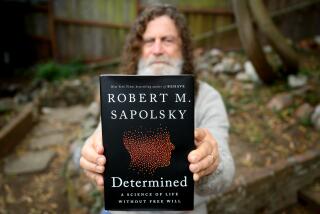NONFICTION - Aug. 29, 1993
- Share via
B. F. SKINNER: A Life by Daniel W. Bjork (Basic: $25; 336 pp.). It’s easy to portray psychologist B. F. Skinner as the Darth Vader of American science. Where leaders from Thomas Jefferson to Martin Luther King saw individual freedom as the highest of human aspirations, Skinner said there was no such thing--a human being, he argued, is little more than a set of memories reacting to the surrounding environment. Where other psychologists at least tried to take in the rich tapestry of social life, Skinner gained insights by isolating not only rats in boxes, but himself as well.
While acknowledging that there is little love lost between Americans and Skinner, Bjork sets out to soften our view toward the founder of “radical behaviorism” by vividly portraying the normality of his childhood (he invented steam cannons to “shoot plugs of potato and carrot over the houses of our neighbors” and made kazoos from combs and toilet paper) and the pain of his adolescence: He would attend dances given by the families of eligible girls, only to discover that couples had paired off at pre-dance dinner parties; “I have a feeling that I shall not survive unbroken,” he wrote in his diary.
Having elicited our sympathy for Skinner’s romantic failures, Bjork goes on to mount a persuasive defense of the intellectually romantic ideas that Skinner embraced instead. The result is a lively biography whose only drawback is its failure to show how far-sighted Skinner’s ideas were: Modern brain researchers have found support for Skinner’s long-derided theories about consciousness, for instance, while his ideas about how the “correctional system” can live up to its name seem all the more relevant in today’s emotionally destructive prisons.
More to Read
Sign up for our Book Club newsletter
Get the latest news, events and more from the Los Angeles Times Book Club, and help us get L.A. reading and talking.
You may occasionally receive promotional content from the Los Angeles Times.










